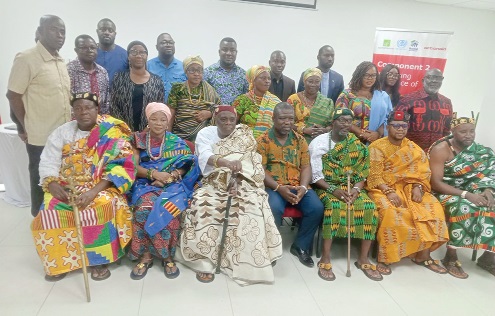ActionAid Ghana, in partnership with UN-Habitat, Habitat for Humanity International, and the University of Twente in the Netherlands, on Wednesday, August 27, launched a USD 3.2 million eco-friendly and community-transformative agenda, ‘Improving Resilience of Coastal Communities in Cote D’Ivoire and Ghana Project,’ at Whuti in the Anloga District in the Volta Region.
Apart from climate adaptation, the project also seeks to ensure vulnerable communities are not left behind in the fight against climate change.
Remarkably, the 34-month project, by its community-driven approach, is mainly anchored on early warning systems, nature-based solutions, and climate-resilient livelihoods.
The mega project is focused on 11 highly vulnerable communities in the Greater Accra and Volta regions.
The communities include Agorkedzi/Atiteti, Agbledomi, Dzita, Tegbi, Woe, Lagbati/Lashibi, and Whuti in the Anloga District.
The others are Azizanya/Kewunor in the Ada East District; and Akaplabanya Wokumagbe and Goi in the West District.
“Our work with these communities is to safeguard Ghana’s coastal ecosystem and sustain the future generations,” said the Country Director of Action Aid Ghana, John Nkaw, as he presented the project plan to the Volta Regional Minister, James Gunu, at the launch.
He said Ghana lost about two metres of coastline every year to erosion, with some hotspots such as Fuveme losing as much as eight metres annually.
He cited a recent and worrying report by the Environmental Protection Agency which estimated that 37 per cent of Ghana’s coastline was under severe threat from erosion and flooding, saying that was very disturbing.
Mr Nkaw said the projection was even scarier with a recent caution from the National Disaster Management Organisation (NADMO) that 1.2million Ghanaians were at risk of displacement if sea levels continue to rise.
“The Ghana Statistical Service has also warned that by 2050, climate-induced flooding and sea-level rise could cause losses of up to USD 1.3 billion annually in affected regions in the country.
The Country Director of ActionAid Ghana mentioned the displacement of more than 4,000 people in the Keta and Anloga areas in 2021 and said that did not project a good future for the people and their livelihood.
The situation is disturbing, as a matter of fact.
Meanwhile, the Regional Project Coordinator at UN-Habitat, Mouhamadu Diene, highlighted the importance of community involvement in the project, saying its success depended on community ownership.
“We encourage the people, especially women, to embrace and support these interventions as they directly benefit their livelihoods,” he added.
Similarly, the Interim Chief of Party at Habitat for Humanity International, Alioune Ndiaye, urged all stakeholders, including government, civil society and communities, to throw their weight behind the project to fully realise its targeted benefits.
Regional Minister
For his part, the regional minister said the region, like many coastal areas across the continent, faced the increasing threat of climate change, rising sea levels, and unpredictable weather patterns.
He said those challenges intimidated the communities, livelihoods and precious ecosystems.
For that matter, Mr Gunu said, the Improving Resilience of Coastal Communities in Cote D’Ivoire and Ghana Project was timely, providing hope and testament to the power of collaboration.
“It perfectly aligns with our national and regional priorities,” he maintained.
The launch was attended enthusiastically by traditional leaders, government sector representatives, Municipal and District Chief Executives, and leaders of various livelihood groups from coastal communities, and members of the public, with great expectations from the project written on their faces.
By all indications, the project is highly appropriate and transformative in nature, as it focuses on early warning systems, nature-based and engineered solutions, and climate-resilient livelihoods, which will equip women, youth, and smallholder farmers with sustainable income options to withstand environmental shocks.
It is also refreshing to note that the project places strong emphasis on community-led design, co-ownership, and sustainability, features the Anloga District Chief Executive, Sandra Seyram Kpedor, as highly cherished by the people.
It is, therefore, hoped that the beneficiary communities will support the project implementers to ensure its timely completion.

